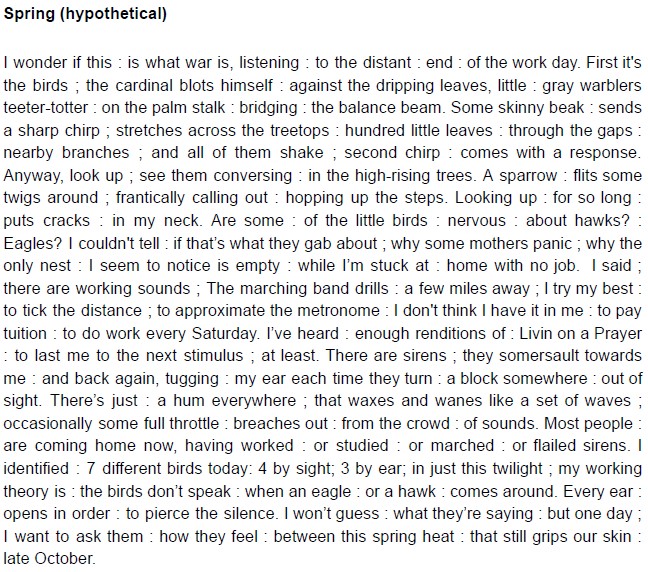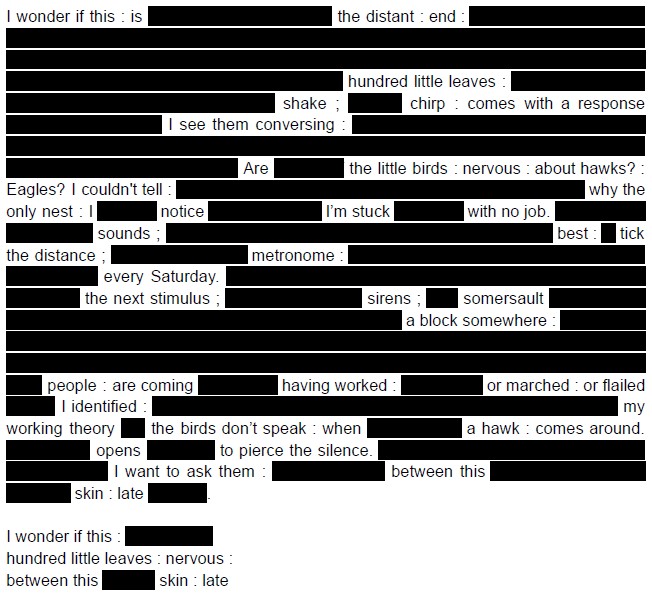from If this planet once again becomes swampland



A Journal of Hybrid Literature and Art
from If this planet once again becomes swampland



3 Questions for Jonce
What was your process for creating this work?
These two poems come from a four-piece cycle called "If this planet once again becomes swampland" where each poem represents one of the four seasons. I began with what later became the "Autumn" poem. You could call me a formalist in the sense that form (or really, just general visual shape and appearance) are priorities for me when I write. When I first started writing poems in 2018, I refused to punctuate my lines. After some mentors coaxed me into playing with punctuation as opposed to abandoning it, I started playing with punctuation and ways to create stoppage and a push-pull effect in the way it is read, both visually and orally. With the colons and semi-colons, they seemed to take on different roles than I expected. The colon became not a period, but just a stop. It felt just as arbitrary as it was intentional because the colons do not symbolize where a complete thought begins and ends—the semicolon does. It became a more "pregnant pause" as my dad would say.
What is the significance of the form/genre you chose for this work?
"If this planet once again becomes swampland" is a cycle of burning haibuns. Of course, these works rely on the centuries-old practice of Japanese haibun made possible by old poets like Basho and Buson. Roger Robinson's work "Haibun for the Lookers" has a particular influence on me. But credit for the idea of a burning haibun goes to torrin a. greathouse. The basic premises of her burning haibuns and erasure as a mode that tries to confront the erasure of transness by the state and transphobic people and institutions by renaming, which is one of the most quintessential processes that trans people must do. Personally, I'm very forgetful, so I also like to think of this as forgetfulness boiling down details into a thesis. Since these are political poems, it is important for me to look and see what can be forgotten as the high watermarks of national crises & revolutionary movements recede.
What is the significance of this work to you?
The main prose block that became the big section of "Autumn" definitely came from a place of despair. When I started to try and apply the burning haibun to it, I was thinking "Okay, enough defeatism, the poem does not have to be this way." By erasing those certain parts that alluded to some sort of defeat of revolutionary movements, the overall loss on the part of humanity to climate change, strangely enough, did not seem as dire or disappointing. The "burned" stanza alludes to a world where maybe revolutionaries won or lost, but there was intense struggle. I've neglected to explain this until now, but it's really memory of class struggle being imprinted onto the land, in this case for the worst. In "Autumn", everyone is freaking dead except for the wasps and squirrels and so on, the survivors. Therefore, they're the only characters worth mentioning. But here's the thing: victory or defeat became a binary that lost some, but not all, of its importance. There was a struggle to be proud of, and that became the focus.
The title of "Spring (hypothetical)" comes from, surprise, not being written in spring at all. In October, I was in a position between jobs and feeling some of the same stomach turns as at the onset of the pandemic. I was feeling a similar limbo as I did then. Trying to write about the beginning of the pandemic has yet to feel right, but the cyclical nature of these poems helped me understand and process that some of the same fears and worries I had were resurfacing under different circumstances. The old isolation became new again. Look, forget the craft talk. I just want to talk to the damn birds. They're always talking, probably juicy gossip too. I know they have a lot to say. I think we could work together to change into something better than America. Their homes are being encroached upon and sometimes they just get unjustifiably killed, by climate change caused by pollution, hunting, unsustainable resource extraction or just negligence. But until such time as we make Winged DuoLingo®, we have to keep working amongst ourselves, us humans, for the changes the entire Earth community needs. People are being evicted, killed by climate change and white supremacist institutions and policies and negligence, too, across the globe. We all need help. We have to organize together.
Jonce Marshall Palmer (they/them) is a nonbinary poet & organizer living in Tallahassee. Their first chapbook, Searching For Smoke Rings, is available from Ghost City Press. You can connect with Jonce and see more of their work on Twitter @masterofmusix or on their website https://jmpalmer.carrd.co.